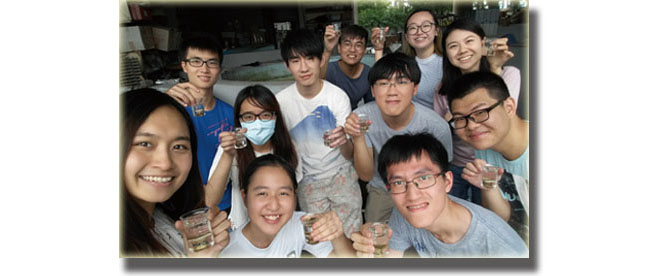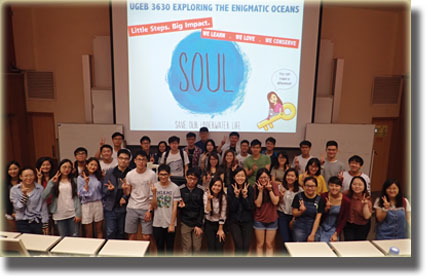|
Dr. Chui Pui Yi Apple obtained her M.Phil. and Ph.D. degrees in Environmental Science and Biology Programmes from the Chinese University of Hong Kong. Her research interests include coral reproduction and larval ecology, coral recruitment dynamics and reef restoration using coral sexual reproduction. She is currently a Lecturer in the School of Life Sciences. Dr. Chui has been actively engaged in public outreach and education activities on marine and coral conservation in Hong Kong since 2011. With practice and experience in public speaking, she has learnt to become a story teller of science, making science easier to understand. She has recently launched the "Adopt a Baby Coral" project to engage her students in environmental stewardship. Dr. Chui is also an amateur underwater photographer, combining her scientific background and photos, she hopes to share with people the diversity and beauty of marine life in Hong Kong waters, to raise awareness and inspire action in marine conservation.
|
 |
Teaching Philosophy
I am a marine biologist, conservationist, underwater photographer and ocean lover. I always hope that my passion together with my years of experience in marine research can help to share the wonders of the ocean, raise awareness and inspire action in marine conservation. Baba Dioum, a famous conservationist, once said "In the end we will conserve only what we love; we will love only what we understand; and we will understand only what we are taught." This is the philosophy that guides my path in general education. As a teacher, I hope my teaching is not only about transmitting knowledge, but changing attitude and transforming habit. UGEB3630 Exploring the Enigmatic Oceans has been a fantastic platform for me to put this in practice.

We are all born curious about our natural world. Unfortunately, this curiosity is lost throughout our schooling years together with the passion that accompany it. In the first lecture, I try to get students intrigued about the content of my course by pointing out some common misconceptions about the ocean, followed by reasons why we should care and learn about the ocean. The main idea is that I want to get students to think about why they are here and what they are going to get out of the course. "Give a man a fish, and you feed him for a day; teach a man to fish, and you feed him for a lifetime." This Chinese proverb reminds me to be a fishing teacher, not a fish giver. My teaching goal is to facilitate learning. Instead of asking students to memorize vast amounts of content, I teach them how to "think" like a marine biologist, always question what you observe and investigate further. It is vitally important to cultivate students' self-learning abilities and develop the realization that learning is actually a life-long process that extends beyond the classroom.
I believe well-designed course materials are very critical to lecture delivery. For example, I incorporate photos, videos, animations, and glossaries into my lectures to help students understand difficult ideas and concepts. Step by step, I also make sure that my teaching materials are designed in a logical and organized manner which bring complex topics to its simplest form. To bring alive the content, I like to use my first-hand experience to share stories whenever possible. Through my enthusiasm for my subject, I have been able to create a positive and enjoyable environment where students feel comfortable sharing and exploring. I also encourage students to ask questions and share their views on subject matters, I believe that by active process of asking questions and seeking answers, it helps students develop critical thinking skills, understand more and retain more.

The visit to Marine Science Laboratory in the Chinese University of Hong Kong is a memorable way to help students understand how marine research happens. Students gain first-hand experience in various research methods, like using transects and quadrats, gathering plankton samples from the sea and using microscopes to observe microscopic organisms. Students also have the opportunity to interact with local sea creatures and participate in coral gardening activities, "adopt" a coral that will be outplanted to the field for restoration work in Hong Kong. These experiences help students to build emotional connections to the ocean, and call forth active engagement to make a difference. Towards the end of the course, I encourage my students to take responsibility to conserve nature by living a sustainable life.
Throughout the course, I inspire the students to know more, to guide them and to instil in them the interests and the realization of how closely related we actually are with the ocean. From understanding to personal responsibility and action, UGEB3630 is a journey towards environmental literacy. Many of my students have expressed satisfaction with my approach to teaching and how those learning experiences gave them a deeper insight in the discipline beyond their major studies. Teaching this course has been the most satisfying and rewarding experience for me, as an educator, to see students becoming enthusiastic about the subject and to take action beyond lectures.

|










